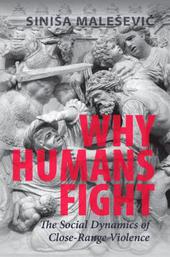
|
Why Humans Fight: The Social Dynamics of Close-Range Violence
Paperback / softback
Main Details
| Title |
Why Humans Fight: The Social Dynamics of Close-Range Violence
|
| Authors and Contributors |
By (author) Sinisa Malesevic
|
| Physical Properties |
| Format:Paperback / softback | | Pages:320 | | Dimensions(mm): Height 228,Width 152 |
|
| ISBN/Barcode |
9781009162814
|
| Classifications | Dewey:303.6 |
|---|
| Audience | |
|---|
| Illustrations |
Worked examples or Exercises
|
|
Publishing Details |
| Publisher |
Cambridge University Press
|
| Imprint |
Cambridge University Press
|
| Publication Date |
6 October 2022 |
| Publication Country |
United Kingdom
|
Description
Malesevic offers a novel sociological answer to the age-old question: 'Why do humans fight?'. Instead of focusing on the motivations of solitary individuals, he emphasises the centrality of the social and historical contexts that make fighting possible. He argues that fighting is not an individual attribute, but a social phenomenon shaped by one's relationships with other people. Drawing on recent scholarship across a variety of academic disciplines as well as his own interviews with the former combatants, Malesevic shows that one's willingness to fight is a contextual phenomenon shaped by specific ideological and organisational logic. This book explores the role biology, psychology, economics, ideology, and coercion play in one's experience of fighting, emphasising the cultural and historical variability of combativeness. By drawing from numerous historical and contemporary examples from all over the world, Malesevic demonstrates how social pugnacity is a relational and contextual phenomenon that possesses autonomous features.
Author Biography
Sinisa Malesevic is Professor of Sociology at the University College, Dublin, and Senior Fellow at CNAM, Paris. His recent books include Contemporary Sociological Theory (with S. Loyal, 2021), Grounded Nationalisms (2019), The Rise of Organised Brutality (2017) and Nation-States and Nationalisms (2013). His work has been translated into 13 languages.
Reviews'Sinisa Malesevic now commands the field dealing with nationalism, war and violence, gaining prize after prize as a result. This is his best book, full of new material, handled with enormous style, knowledge and subtlety. This book will last.' John Hall, McGill University 'Malesevic begins with a penetrating critique of genetic, biological, and psychological explanations for why humans fight, whether they be mere brawlers or trained soldiers. He then proceeds to a more sociological approach, while stressing the variability of fighting experiences. His arguments are supported by immense learning and a flow of acute insights into human violence. This is a must read for anyone interested in violence and war.' Michael Mann, University of California, Los Angeles 'Like Goya's war paintings, Why Human Fight surveys its horrible subject matter with an unblinking gaze. One of the many achievements of this extraordinary survey is to zoom in closely upon the often-overlooked micro-solidarities that enable social pugnacity to develop. Here Malesevic's own interrogation of diverse literatures is relentless; his curiosity boundless; and his insights often startlingly original. A dark, and exhilarating, survey: and, in the troubled 21st century, an urgently needed book.' Tim Wilson, University of St Andrews 'This exceptionally wide-ranging study lives up to its multidisciplinary ambitions by offering both in-depth research on particular instances of violence, and panoptic breadth in terms of its comprehension and digestion of an ever-widening research field. Malesevic manages to bring together and offset different strands of scholarship and formulate a clear new perspective that will offer food for thought for a good while.' Ugur Ungor, University of Amsterdam 'Sinisa Malesevic has delivered a sweeping social history of face-to-face violence. In this masterful book, Malesevic shows how violence is an inherently social, relational phenomenon, and he identifies the social structures that lay the foundation for organized killing. This book is ambitious, rigorous, and deeply convincing.' Erica Chenoweth, Harvard University
|